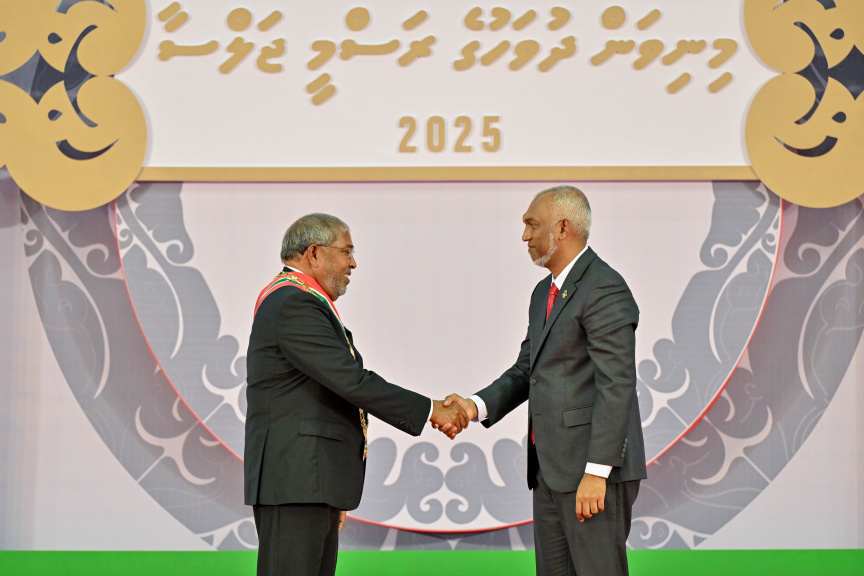
President Dr. Mohamed Muizzu confers the Order of the Distinguished Rule of Izzuddin to Jumhoory Party (JP)'s leader Qasim: President Dr. Mohamed Muizzu confers the Order of the Distinguished Rule of Izzuddin to Jumhoory Party (JP)'s leader Qasim Ibrahim: Qasim has voiced out support for recent amendments to Decentralization Act constricting the powers of local councils (Photo/President's Office)
Jumhoory Party (JP) leader and Maamgili MP Qasim Ibrahim voiced support for the recent government-backed amendments to the Decentralization Act, which constricts the powers granted to local councils.
President Dr. Mohamed Muizzu ratified the amendments amidst concerns from local councils.
Qasim, on Sunday, spoke out in favor of the amendments, citing that it was necessary in consideration of the current circumstances.
He emphasized that the Maldives operates under a unitary system of governance as defined by its constitution, rather than a federal system. Therefore, he stated that the Decentralization Act should be consistent with the principles of a unitary system to the greatest extent possible, and that all related laws should also reflect this framework.
“For example, there should be no opportunity to award land plots from islands or hire large numbers of staff for political gain ahead of the upcoming election. Such actions constitute undue benefits. Laws should not grant councilors the authority to create jobs beyond what the government’s finances can sustain, merely to improve their chances of re-election,” he said.
With nine months remaining in the term of incumbent councilors, Qasim said councilors should be sincere to the unitary system outlined in the constitution. He explained that island development plans are created based on public input, and therefore, councilors taking independent initiatives outside these plans for political purposes ahead of the election is detrimental to the nation.
“This amendment truly benefits the public rather than the government,” he added.
Notably, President Muizzu ratified the amendments to the Decentralization Act after several councils had released statements urging otherwise.
The amendments introduces five key changes to local governance. Local authority companies will now be restricted to essential rural infrastructure projects exceeding MVR 10 million and must cease competition with private enterprises within 90 days of the amendment's enactment.
Additionally, councils are prohibited from charging rent for land or buildings used for basic public services. They will receive revenue after state tax deductions, provided they are not delinquent in public service payments for over six months. Councils are also mandated to maintain bank accounts according to Ministry of Finance procedures and provide statements upon request. In their final year, councils will face restrictions on new employee recruitment, leasing land, lagoons, or reefs, and initiating new development projects not previously outlined in their plans.
Regulations are also being amended to impose restrictions on councils nearing the end of their 365-day term. These include adhering to norms set by the Ministry of Finance and the Local Government Authority (LGA) for actions such as recruiting employees, leasing land, lagoons, and reef areas, and commencing new development projects not already outlined in their plans. It is important to note that these amendments do not grant additional authority to the LGA, the parent body of the councils.
While speaking to the President during his recent tour of Baa Atoll, B. Dhonfanu Council President Ahmed Irushad emphasized that decentralized financial empowerment was crucial for Dhonfanu's development, more so than a council building.
In defense of the reform, President Muizzu spoke at B. Dharavandhoo during his Baa Atoll Tour last Wednesday evening. He asserted his comprehensive understanding of decentralization, stating that the changes are ultimately for the benefit of the people. "I know decentralization from A to Z," he stated.
"One of the reforms is that some councils have now created local authority companies. These local authority companies are running small businesses normally run by ordinary people in rural areas. Like the grocery shops on street corners. This is actually preventing the public from attaining wealth in these markets,” he said.
He also noted that most councils do not disclose their account balances. He added that some councils spend money near elections and carry out projects not aligned with the island's development for political purposes, a practice he stated must be stopped.